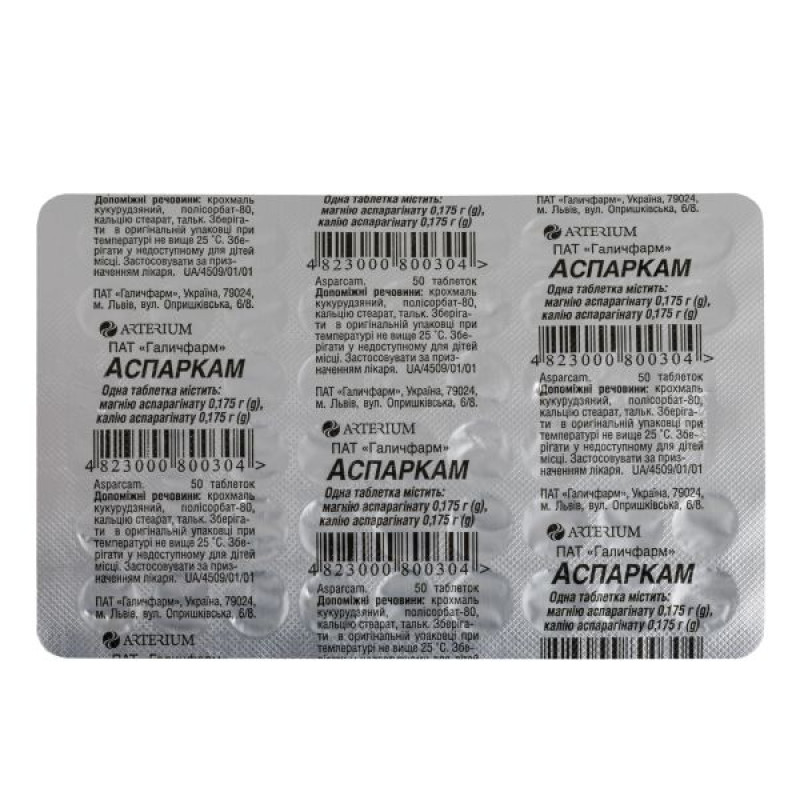Asparkam tablets blister No. 50

Instructions for Asparkam tablets blister No. 50
Composition
active ingredients: 1 tablet contains magnesium asparaginate 0.175 g; potassium asparaginate 0.175 g;
excipients: corn starch, polysorbate-80, calcium stearate, talc.
Dosage form
Pills.
Main physicochemical properties: white tablets with a smooth surface, flat-cylindrical, with a score, with a specific odor. Marbling is allowed on the surface of the tablets.
Pharmacotherapeutic group
Mineral supplements. Magnesium preparations.
ATX code A12C.
Pharmacological properties
Pharmacodynamics.
Potassium and magnesium ions, as important intracellular cations, are involved in the work of a number of enzymes, in the process of binding macromolecules to subcellular elements, and in the mechanism of muscle contraction at the molecular level. The ratio of extracellular and intracellular concentrations of potassium, calcium, sodium, and magnesium ions affects the contractile ability of the myocardium. Aspartate, as an endogenous substance, is a carrier of potassium and magnesium ions, has a pronounced affinity for cells, and its salts are subject to dissociation only to a small extent. As a result, the ions penetrate the intracellular space in the form of complex compounds. Magnesium aspartate and sodium aspartate improve myocardial metabolism. Insufficient potassium and magnesium content in the body increases the risk of developing arterial hypertension, atherosclerotic lesions of the coronary vessels, heart rhythm disturbances, and myocardial pathology.
Pharmacokinetics.
Didn't study.
Indication
Additional therapy for chronic heart diseases (in case of heart failure, in the post-infarction period), for heart rhythm disorders, primarily for ventricular arrhythmias.
Adjunctive therapy in treatment with digitalis drugs.
In conditions accompanied by hypokalemia and hypomagnesemia (including overdose of saluretics).
Contraindication
- Hypersensitivity to the components of the drug;
- acute and chronic renal failure;
- Addison's disease;
- hyperkalemia, hypermagnesemia;
- atrioventricular block II-III degree;
- cardiogenic shock (BP < 90 mmHg).
Special precautions: With prolonged use of the drug, it is necessary to monitor the level of potassium and magnesium in the blood, as well as regular monitoring of electrolyte hemostasis indicators and ECG data.
Asparkam, as a drug containing potassium and magnesium, should be used with caution in patients with myasthenia gravis; in conditions that may lead to hyperkalemia, such as acute dehydration, widespread tissue damage, in particular severe burns. For this category of patients, it is recommended to regularly examine the concentration of electrolytes in the blood serum.
Asparkam should not be prescribed to patients with gastroduodenal ulcers or obstruction.
Interaction with other medicinal products and other types of interactions
Due to the presence of potassium ions in the composition of the drug, when using Asparkam with potassium-sparing diuretics, ACE inhibitors, beta-blockers, cyclosporine, the risk of developing hyperkalemia increases (control of potassium levels in the blood plasma is required) and the inhibitory effect on intestinal peristalsis increases.
The drug inhibits the absorption of oral forms of tetracycline, iron salts, and sodium fluoride (a three-hour interval between doses must be observed).
Asparkam enhances the effect of drugs that stimulate trophic processes in the myocardium; prevents the development of hypokalemia caused by the use of saluretics, corticosteroids, cardiac glycosides. Asparkam reduces the cardiotoxic effect of cardiac glycosides.
When used simultaneously with antidepolarizing muscle relaxants, neuromuscular blockade is enhanced, and with anesthetics (ketamine, hexanal, fluorotan) - the central nervous system is depressed.
Asparkam may reduce the effectiveness of neomycin, polymyxin B, tetracycline, and streptomycin.
Use during pregnancy or breastfeeding
There is no data on the negative effects of the drug during pregnancy or breastfeeding. However, the use of the drug is possible if, in the opinion of the doctor, the expected benefit to the mother outweighs the risk to the fetus or child.
Ability to influence reaction speed when driving vehicles or other mechanisms
Asparkam does not affect the reaction speed when driving or working with other mechanisms.
Method of administration and doses
The usual daily dose for adults is 1-2 tablets 3 times a day. The dose can be increased to 3 tablets 3 times a day. Gastric juice can reduce the effectiveness of the drug, so it is recommended to take the tablets after meals.
The course of treatment is determined by the doctor.
Children
There is no experience with the use of the drug in children.
Overdose
At the moment, no cases of overdose have been registered. Theoretically, in case of overdose, symptoms of hyperkalemia (nausea, vomiting, diarrhea, abdominal pain, metallic taste in the mouth, bradycardia, weakness, disorientation, muscle paralysis, paresthesia of the extremities) and hypermagnesemia (redness of the face, thirst, arterial hypotension, hyporeflexia, impaired neuromuscular transmission, respiratory depression, arrhythmia, convulsions) may develop. The electrocardiogram shows an increase in the height of the T wave, a decrease in the amplitude of the P wave, and a widening of the QRS complex.
Treatment: drug withdrawal, symptomatic therapy (intravenous administration of calcium chloride solution at a dose of 100 mg/min), if necessary - hemodialysis.
Adverse reactions
Adverse reactions develop very rarely:
from the digestive tract: nausea, vomiting, diarrhea, abdominal pain, discomfort or burning sensation in the epigastric region, gastrointestinal bleeding, ulcers of the digestive tract mucosa, dry mouth;
from the cardiovascular system: myocardial conduction disorders, decreased blood pressure, AV block;
from the central and peripheral nervous system: possible paresthesias, hyporeflexia, convulsions;
allergic reactions: itching, redness of the skin, rash;
On the part of the respiratory system: possible respiratory depression (due to hypermagnesemia);
others: feeling hot.
Expiration date
3 years.
Storage conditions
In the original packaging at a temperature not exceeding 25 0 C. Keep out of the reach of children.
Packaging
50 tablets in blisters; 50 tablets in a blister, 1 blister in a pack.
Vacation category
Without a prescription.
Producer
PJSC "Halychpharm".
Location of the manufacturer and its business address
Ukraine, 79024, Lviv, Opryshkivska St., 6/8.
There are no reviews for this product.
There are no reviews for this product, be the first to leave your review.
No questions about this product, be the first and ask your question.









